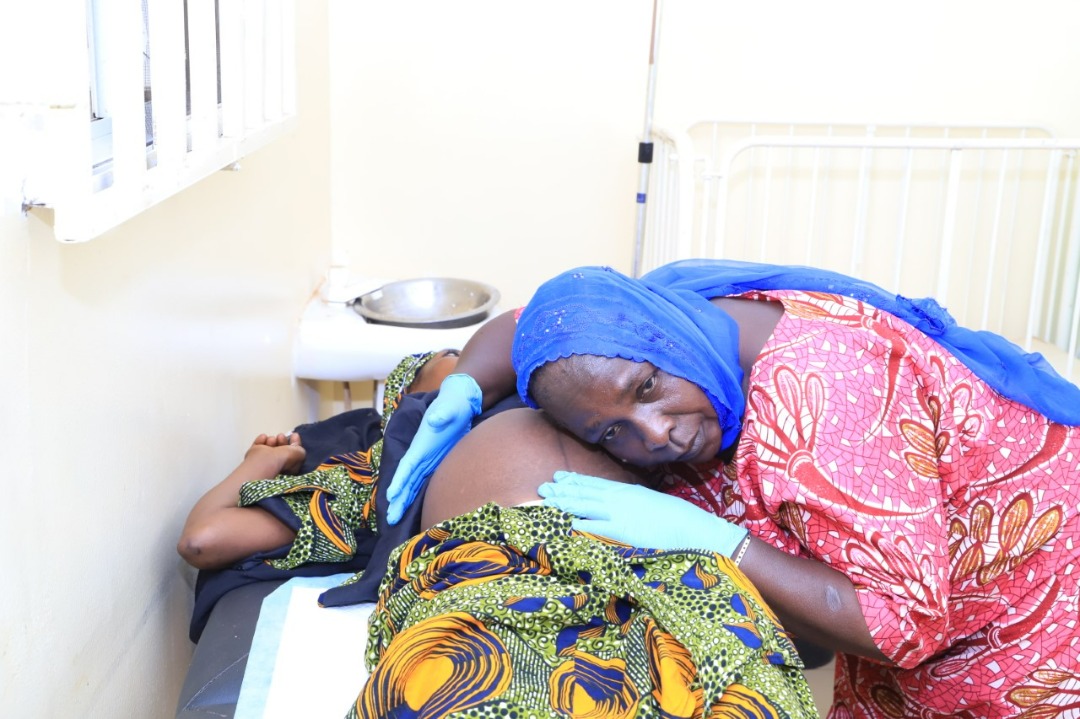It is mid-morning on a Wednesday and Liliatu Ayuba is on her way back to the camp clinic after a short break. She is well respected in the Durumi Internally Displaced Person’s (IDP) camp and constantly pauses to respond to greetings of “Ina Kwana Maman Auta (Good morning, Maman Auta),” as she is fondly called.
Spotting a pregnant woman who should be at the clinic, with mock displeasure she asks, “Ah ah! Me kikeyi har yanzu a gida? Baki san lokacin awu bane yanzu? Haba, bawai zaki biya kudin mota bane kije asibiti ba fa ko kuma a ce zaki biya kudin awu ba fa.” (Ah ah! What are you still doing at home? Don’t you know it’s time for antenatal? It’s not as though you are paying for transportation to go to the clinic or paying for antenatal care.)
“Kiyi hakuri Maman Auta,” the woman replies, “Yanzu zan kama hanyar asibiti.” (I’m so sorry Maman Auta, I will soon be on my way to the clinic).
The Durumi Internally Displaced Person’s (IDP) camp is one of the many refugee camps established during the height of the Boko Haram crisis. It was established in 2012 and is currently inhabited by over 3,000 refugees. Sixty-two-year-old Ayuba from Gwoza Local Government Area (LGA) in Borno State was one of the first residents in the Camp.
“When Boko Haram insurgents started entering our communities, many people left their communities to look for safety elsewhere. I also ran for my life. My husband who was a military man was killed by the insurgents, and my son was badly injured.” says Ayuba, who is a Traditional Birth Attendant (TBA) and the Camp’s Woman Leader.
A heightened risk
Ayuba had trained as a TBA under her grandmother, herself a well-known TBA during her time. At the camp however, although there were no medical facilities — and pregnant women arrived almost daily — still mourning her loss, she didn’t offer her services. Until a tragic incidence happened.
Thirty-six-year-old Amira Bultu arrived at the Durumi Camp with a seven-month-old pregnancy. Two days after her arrival, she went into premature labour and was rushed to a nearby government hospital. However, because she couldn’t make the ₦150,000 deposit, the hospital refused her treatment. Amina died while giving birth. No one could afford to pay for an incubator, so the baby died soon after.
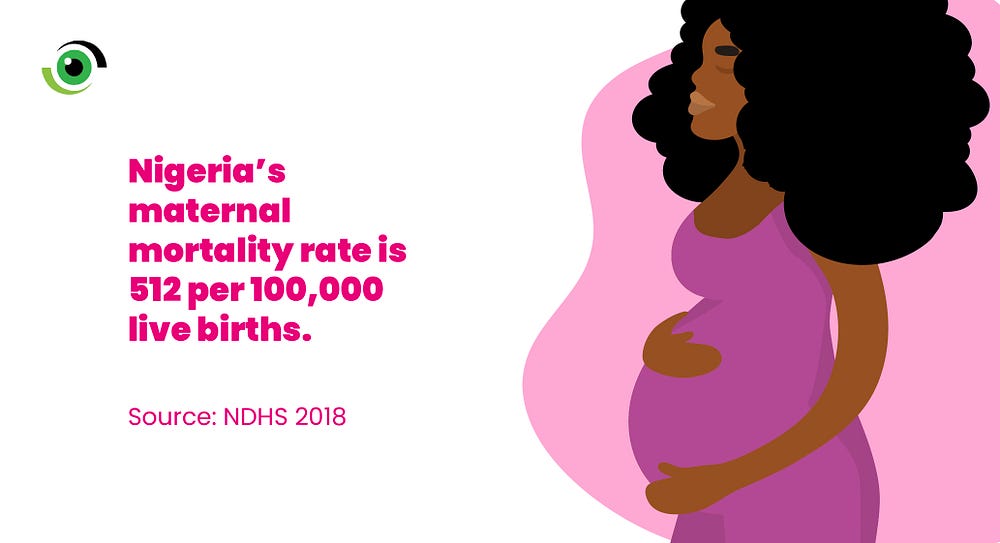
Humanitarian crises increase the risk of negative health outcomes for women and their infants, due to a sudden loss in medical support. This is exacerbated by limited access to essential social services and information, widespread population displacement, trauma, malnutrition or disease, and exposure to violence.
Data from the 2018 Nigeria Demographic and Health Survey (NDHS) shows that Nigeria’s maternal mortality rate is 512 per 100,000 live births. However, insecurity challenges and recently, the COVID-19 pandemic may well have increased this number as according to the United Nations, 60% of preventable maternal deaths happen in situations of displacement or conflict.
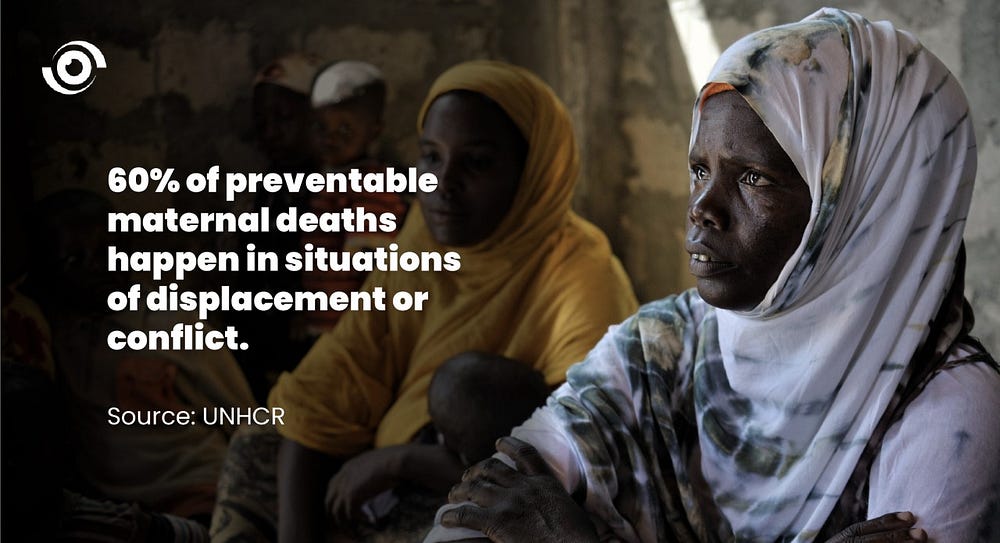
Not on my watch
Ayuba decided to take the pregnant women in the camp under her wing, supporting them through their pregnancy journeys and helping them deliver their babies. Although she had basic training, she is not recognised as a medical practitioner and is committed to helping the women because they cannot afford skilled birth attendance. Ayuba works with a team of three women — Hadiza whom she trained and is currently her assistant, Juliana who she is currently training and a cleaner. Acknowledging their limitations, Ayuba says she often takes the women to Wuse General Hospital for antenatal classes. However, that is no longer necessary as a nurse now runs an antenatal clinic within the camp which operates on Mondays and Wednesdays. The nurse also takes deliveries when they occur during her time in the camp.
Over the years, organisations and individuals have helped build her capacity and improve the circumstances under which she operates. In 2016, an individual paid for an eight-month training where Ayuba learned how to administer life-saving injections and help women deliver their babies in a safer way.
In 2018, an organisation called Network Aid for Humanitarian Assistance built a clinic. Ayuba was elated that she could finally move the women from the makeshift tents under which they gave birth to a much safer location for the mothers and their new-borns.
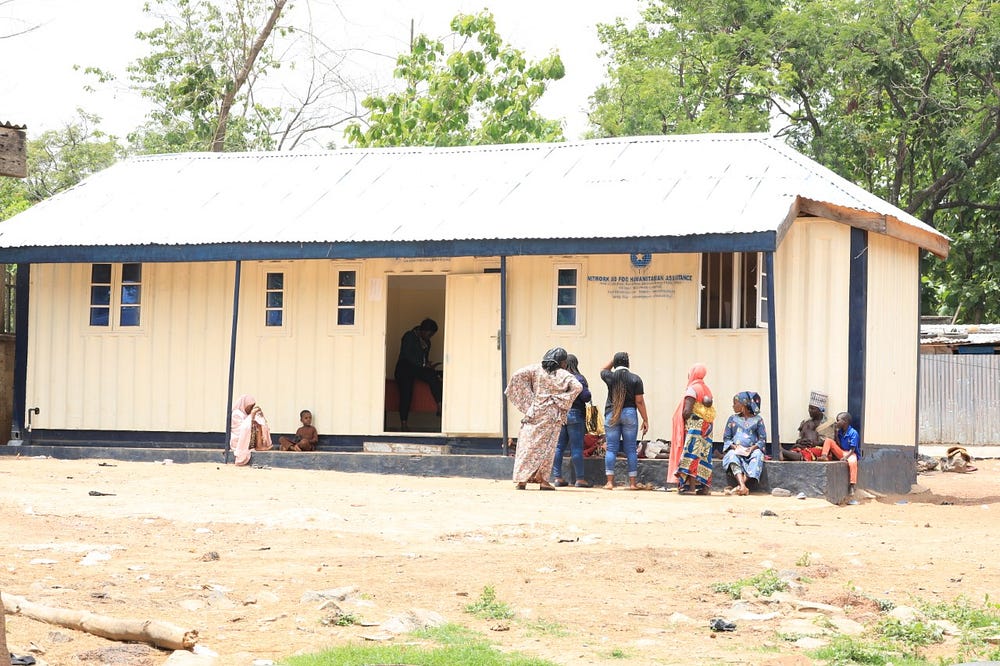
In addition, Ayuba and her assistant participated in an eight month training programme conducted by the National Primary Health Care Development Agency (NPHCDA) in the areas of maternal health, antenatal care, Bacillus Calmette–Guérin (BCG) vaccination, and family planning.
She also has the emergency contact of doctors whom she can reach out to in an emergency. ‘’If I see any problem I can’t handle, I have contacts of some individuals from the hospital, and when I call them, they send an ambulance from Asokoro General Hospital. The women go for surgery, and the doctors do it successfully without collecting a penny from us,” she adds.
There is no denying the fact that Ayuba and her team are helping to plug a gap in reproductive and maternal healthcare services among poor and vulnerable women within and outside the camp. In eight years, they have delivered over 200 babies and Ayuba says she has recorded every single one of them.
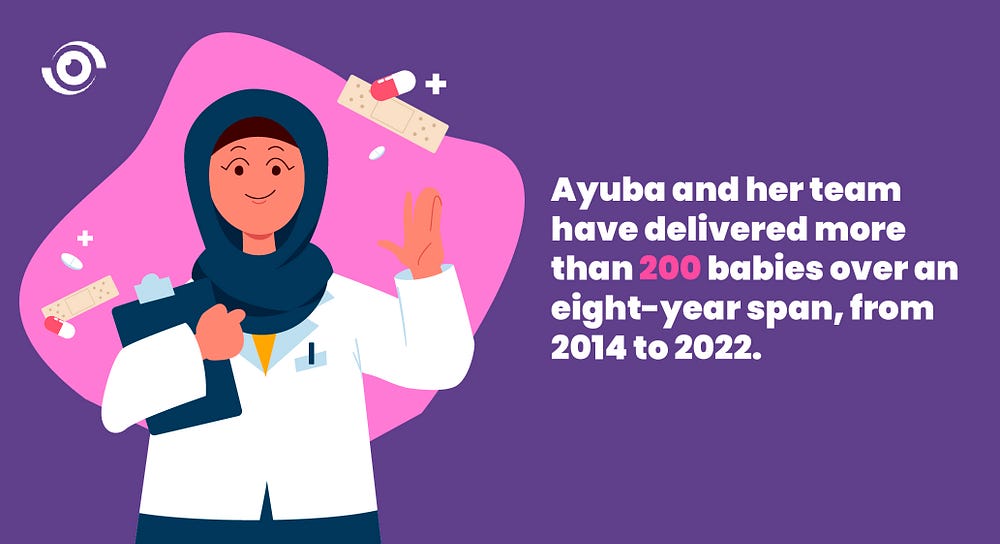
The women whose babies they birthed compete to narrate their experiences. “Mama Auta, and Aunty Hadiza who is her assistant are the only people who help us deliver our babies in this camp. I gave birth to three children in this camp, and I have never been to the hospital to deliver my babies.” says Hadiza Umar.
“I love and appreciate how the TBAs in this camp take care of us during delivery and what they teach us during delivery. They wash our clothes and help us take our bath which the hospitals don’t offer. They give us olive oil for our babies, and they come visit us after every two days to check on us and our babies. If there is injection to be given, they come to our houses to give us the injection. We enjoy their services, and they are very good to us,” Aisha Ibrahim chips in.
An integrated approach
Ayuba declares that she has never recorded any death since she started her practice. While this is commendable, there is no discounting the fact that most of these deliveries occur in unsanitary conditions, exposing the new babies, the mothers and even the TBAs to infections.
Sometimes, the clinic lacks basic but critical necessities like birthing kits, essential medicine and disinfectants. The availability of these essential materials is largely dependent on goodwill, but the gifts do not come in regularly. Occasionally, the clinic receives donations of birth kits, detergents, and disinfectants from religious bodies, and civil society organisations, as well as kind-hearted individuals.
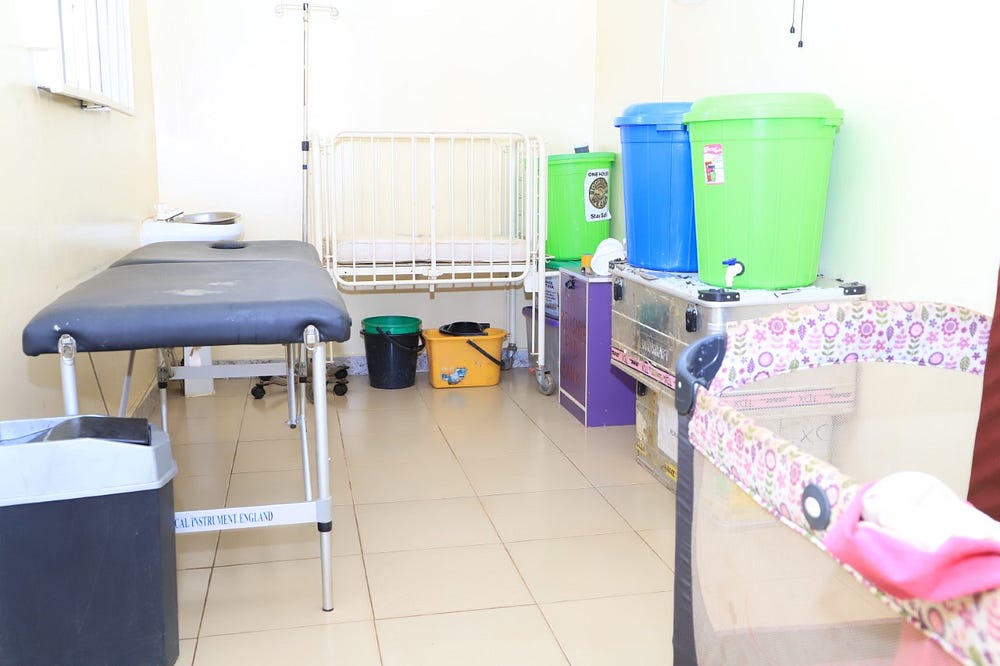
They are also limited by the fact that, although they have received some training, they do not have the required formal training and therefore are unskilled to handle emergencies which means they need further training. Ayuba knows to refer complications to a health facility, and through training is better able to read the danger signs and refer the woman to a health facility.
The ‘Why are Women Dying While Giving Birth in Nigeria’ report recommends that TBAs should be better equipped and trained in identifying danger signs and referring women to health facilities at the first sight of any danger sign. State governments must ensure that the activities of unskilled birth attendants are institutionalised and regulated. At the community, state and national levels, there must be established guidelines for the operation of TBAs and other skilled birth attendants.
Ideally, every pregnant woman should have access to a skilled birth attendant in a well-equipped health facility. In areas or situations where this is impossible and access to healthcare is unreliable, such as in the IDP camps, steps must be taken to up skill the available TBAs supporting pregnant women through childbirth. Although TBAs are not recognised in any task shifting task sharing policy in Nigeria, considering the fact that they are plugging a vital gap in maternal and childcare, they should be considered a trained option in areas where the health workforce is inadequate.
Maternal and neonatal health care is a priority. It is critical to take advantage of the best available options to increase the numbers of skilled health workers while considering the effectiveness of the proposed approach, the risk of harm and the importance of focusing on the unique contexts and cultural peculiarities of the patient.
Strengthening primary health care must also be an imperative. The pregnant women in the IDP camp have limited options when they are pregnant and seek the services of TBAs. The National Health Insurance Authority (NHIA) through the recently signed Act aims to provide 83 million vulnerable Nigerians with healthcare as health insurance is now mandatory. The pregnant women in the Durumi IDP Camp would then be recipients of healthcare provided by skilled birth attendants.


